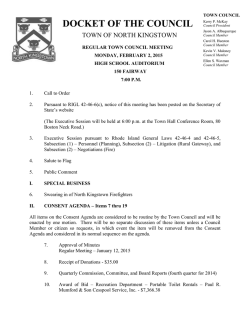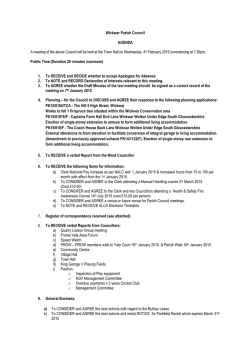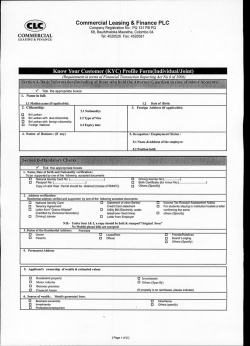
Trails End Campground, LLC v. Brimstone Recreation, LLC et al.
IN THE COURT OF APPEALS OF TENNESSEE AT KNOXVILLE October 2, 2014 Session TRAILS END CAMPGROUND, LLC v. BRIMSTONE RECREATION, LLC ET AL. Appeal from the Chancery Court for Scott County No. 10,481 Jon Kerry Blackwood, Judge 1 No. E2014-00336-COA-R3-CV-FILED-JANUARY 29, 2015 The plaintiff, Trails End Campground, LLC (Trails End) and the defendant Brimstone Recreation, LLC (Brimstone) are competitors in an outdoor recreation-oriented market in and around Scott County. In 2012, the defendant Town of Huntsville executed a lease with Brimstone giving it “the exclusive use, control and enjoyment” of a centrally-located open area in the town, sometimes referred to as Town Square, during the weeks prior to and including Memorial Day and Labor Day. Trails End brought this action alleging (1) that the Town acted without authority under its charter to execute such a lease; (2) that it created a perpetuity and monopoly in violation of the state constitution; and (3) that it violated the Tennessee Trade Practices Act (TTPA), Tenn. Code Ann. § 47-25-101 to -112 (2013). The trial court granted the defendants summary judgment. We hold (1) that, under its charter, the Town had authority to enter into the lease, (2) that the lease does not create an unlawful monopoly or perpetuity, and (3) that the TTPA is not implicated by the facts of this case. The judgment of the trial court is affirmed. Tenn. R. App. P. 3 Appeal as of Right; Judgment of the Chancery Court Affirmed; Case Remanded C HARLES D. S USANO, JR., C.J., delivered the opinion of the Court, in which D. M ICHAEL S WINEY and T HOMAS R. F RIERSON, II, JJ., joined. David A. Stuart, Clinton, Tennessee, for the appellant, Trails End Campground, LLC. Vic Pryor, Jacksboro, Tennessee, for the appellee, Brimstone Recreation, LLC. Nathan D. Rowell and Brian R. Bibb, Knoxville, Tennessee, for the appellee, Town of 1 Sitting by designation. Huntsville, Tennessee. OPINION I. Shortly after Trails End filed its complaint, both sides moved for summary judgment. Trails End states in its brief that “[t]he parties in this action are in agreement that the material facts are not in dispute and that judgment as a matter of law is appropriate.” In its statement of undisputed material facts, Trails End described its business, and that of its competitor, Brimstone, as follows: Both [Trails End and Brimstone] provide trail access to recreational riders, ATV rentals, cabin and camping rentals, recreational activities, musical events and other entertainment, and other goods and services to the recreational users of off-road trails located in and near the Town of Huntsville. Both plaintiff and defendant, Brimstone, are in competition with each other to attract the same customers in the same market. The market in question consists of the users of the recreational off-road trail networks in and near the Town of Huntsville in Scott County, Tennessee, and the similar entertainment and recreational facilities offered by these competitors. In addition to the land leased by defendant, Brimstone, for recreational trail use, plaintiff owns and/or has access to lands with recreational trails, and there is a large tract of property accessible to the general public administered by [Tennessee Wildlife Resources Agency] which is used for recreational trail riding and other outdoor purposes. Plaintiff and defendant, Brimstone, are the only significant competitors in this market in terms of the magnitude, scope and similarity of products and services offered to the users participating therein, and they each have no other major competitors in the market offering the same comprehensive package of products, goods and services. Tangible goods and products offered for sale in this market by these competitors include but are not limited to food, toiletries, clothing, camping supplies, fuel, firewood, water, non-alcoholic beverages, beer, -2- recreational equipment, hardware, accessories, artwork, souvenirs and other goods and products obtained and provided to customers as requested when possible. Beginning in approximately 2006, the Town of Huntsville permitted the property variously known as the Town Mall, Town Square and/or Courthouse Mall to be utilized by [Brimstone] and others to promote and facilitate Memorial Day and Labor Day weekend events which attract thousands of recreational users and others to the area. Until 2012, these events were open to the public and no one was prohibited from participating therein, whether as a vendor, purchaser or both, and at least since 2006, at all times, the Courthouse Mall has always been freely accessible to the public. To the best of the knowledge, information and belief of plaintiff, the exclusive use of that property has never been afforded to any person or entity at any time until the actions leading to the lease agreement giving rise to this complaint. The Courthouse Mall has been utilized from time to time by numerous vendors who have leased, rented or been permitted to use space on the mall by defendant, Town of Huntsville, and it was not until 2013 that the exclusive use, possession and control was perpetually leased to defendant, Brimstone, for the weeks of the Memorial Day and Labor Day Holidays, to the exclusion of all others. Ordinarily, the Courthouse Mall or Town Square is freely accessible to the public for any lawful activities, and its exclusive use is not ordinarily granted to any single person or entity, or to any exclusive group, but rather, the space is customarily and traditionally open to all on an equal basis. (Paragraph numbering in original omitted.) The Town’s Board of Mayor and Aldermen met on September 27, 2012. The minutes reflect a “[m]otion by Paul Lay, second by Kris Lewallen to authorize Mayor Potter to contract with Brimstone Recreation, LLC for exclusive use of the Huntsville Mall for their Memorial Day and Labor Day weekend events for a fee of $1,000.” The motion passed on a 4-0 vote, with Vice Mayor Mark Love not voting “due to appearance of a conflict of interest” resulting from Love’s position as managing member of Brimstone. On December 21, 2012, Mayor George Potter executed the lease at issue on behalf of the Town. It -3- provides, in pertinent part, as follows: Huntsville is the owner of what is known as the “Town Square” . . . together with the parking spaces surrounding and in the area of said Town Square, . . . all of which is collectively referred to hereafter as the “Premises”; and . . . Brimstone wishes to lease the Premises area for use with special events conducted or sponsored by Brimstone twice annually . . . * * * Huntsville hereby leases to Brimstone the exclusive use, control and enjoyment of Premises . . . for the intended purposes of conducting the respective event to include but not limited to event advertising and promotion, erection of temporary tents or other nonpermanent facilities, display and sale of merchandise and products, sale of event access passes, booking of accommodations, distribution of brochures and any other activity related to the events conducted by Brimstone that do not conflict with the Town’s mission or quality of life and is not morally objectionable to a reasonable person. The approximate times of such special events to which this Lease Agreement is applicable are as follow[s]: – The week prior and including the weekend of Memorial Day for each year starting in the year 2013 and thereafter every subsequent year during the lease term and renewal lease terms. – The week prior and including the weekend of Labor Day for each year starting in the year 2013 and thereafter every subsequent year during the lease term and renewal lease terms. The initial term of this Lease Agreement shall be ten (10) years and shall be renewable at the option of Brimstone for successive terms of 10 years each upon giving of thirty (30) days notice. (Paragraph numbering in original omitted.) In the lease, Brimstone agreed to pay the Town $1,000 per year. -4- Brimstone filed the affidavit of its managing member, Love, which states, in pertinent part, as follows: Brimstone is an entity that leases nineteen thousand (19,000) acres adjacent to the Town of Huntsville. Brimstone provides permitted trail access to recreational riders, ATV rentals, cabin rentals, camping rentals and sundries to recreational users. Brimstone also has events with live entertainment for its patrons and the community at large on a stage constructed on it[]s premises. These events occur two times a year – Memorial Day weekend and Labor Day weekend. The events have major musical acts performing and attract a large number of patrons to Huntsville and the surrounding area. Brimstone began hosting these musical events in 2006. The Brimstone property is very near the Huntsville town square, which is a large grassy area in front of the old Scott County Courthouse. The Huntsville town square is the site of various events. The Town of Huntsville hosts a large Fourth of July event where numerous vendors rent space to set up their booths around the perimeter and inside the square area. The Huntsville town square is available for rent to the public or businesses at times when it is not otherwise reserved. Trails End, LLC (Trails End) is a campground and competitor of Brimstone located outside the city limits of Huntsville, Tennessee. Trails End, LLC began hosting musical events on its premises in May 2013 at the same time as Brimstone’s May 2013 event. Brimstone entered the long term lease on December 26, 2012 . . . in order to assure the use of the town square for Brimstone’s use on the two weekends each year that it traditionally uses the -5- square. The town square area is used for registration and information distribution for patrons that attend the Memorial Day and Labor Day events conducted by Brimstone. * * * Brimstone allows vendors to set up for a fee inside its premises. Brimstone does not rent spaces to vendors on the Town Square. Vendor[s] or sponsors are sometimes allowed to set up at the registration tent located in the Town Square at events for informational purposes. At the outset of Memorial Day 2013 event on May 23, 2013, Trails End, LLC set up its promotional area immediately adjacent to the Brimstone registration tent in Town Square [in] a provocative manner. Trails End, LLC did not ask or receive permission from Brimstone to set up its promotional material area. Trails End, LLC paid no fee for its space. At the Memorial Day event of 2013, employees and agents of Trails End, LLC were disruptive and confrontational to employees, vendors and patrons of the Brimstone event at the town square and put them in fear of their safety . . . * * * Due to [the] disruptive and threatening behavior of . . .Trails End, LLC agents and employees, all persons affiliated with Trails End, LLC were removed from the premises to avoid violence and to allow patrons to attend the event without being harassed.2 2 Included in the record is a copy of a temporary restraining order and mandamus issued by the Scott County Chancery Court ordering representatives of Trails End to “immediately remove all blockage and obstructions of access to” a certain area in or around the Town Square and restraining them from “in any (continued...) -6- On August 23, 2013, Trails End filed its complaint alleging that “the terms of the Lease Agreement are plainly outside the scope of the authority conferred upon the mayor by the Board of Mayor and Aldermen, and the same is accordingly ultra vires and void.” 3 (Italics in original.) The complaint further alleges that the lease violates both Article I, § 22 of the Tennessee Constitution, which provides that “perpetuities and monopolies . . . shall not be allowed,” and the TTPA, Tenn. Code Ann. § 47-25-101, which provides as follows: All arrangements, contracts, agreements, trusts, or combinations between persons or corporations made with a view to lessen, or which tend to lessen, full and free competition in the importation or sale of articles imported into this state, or in the manufacture or sale of articles of domestic growth or of domestic raw material, and all arrangements, contracts, agreements, trusts, or combinations between persons or corporations designed, or which tend, to advance, reduce, or control the price or the cost to the producer or the consumer of any such product or article, are declared to be against public policy, unlawful, and void. On September 26, 2013, Trails End moved for summary judgment “as to all issues except damages, costs, expenses and attorney fees.” Brimstone responded with its own motion for summary judgment. After a hearing, the trial court entered an order on November 26, 2013, granting Brimstone summary judgment and holding that (1) “[n]othing in this record establishes that the entering into of the . . . lease by the [Town] and Brimstone was an ultra vires action”; (2) the lease did not create an unlawful monopoly because Trails End “failed to show that there was a common right open to the public to utilize the Town Mall . . . that the granting of the lease infringes”; and (3) “the TTPA applies only to goods[,] not services,” and “[a]lthough Mr. Rose’s affidavit makes reference to the various sales of sundries, the primary business of Brimstone is to provide services.” After the court granted Brimstone summary judgment, the Town filed a motion for summary judgment. Trails End filed a motion to amend its complaint, and a “motion to alter or amend judgment and to make additional findings of fact and conclusions of law.” After 2 (...continued) other manner harassing, threatening or interfering with the use of said 0.261 acre tract by Brimstone Recreation[.]” 3 Trails End also alleged that the defendants violated the Tennessee Consumer Protection Act, Tenn. Code Ann. § 47-18-101 et seq. It later abandoned its TCPA claim when it filed an amended complaint. -7- another hearing, the trial court granted the Town summary judgment in an order providing as follows: The Motion to Alter or Amend does not cite any new controlling law that has changed since the November 21, 2013 judgment. Similarly, no new unavailable facts are alleged. The basis for the Motion is clearly an effort to obtain additional discovery. Accordingly, the Motion to Alter or Amend is denied. The Court grants the Plaintiff the right to amend the complaint and file an amended complaint. However, in considering the Amended Complaint in conjunction with the [Town] of Huntsville’s Motion for Summary Judgment, the Court concludes that the [Town] of Huntsville is entitled to summary judgment based upon the identical reasoning contained in the Court’s Order of November 21, 2013, granting summary judgment [to] Brimstone Recreation LLC. Trails End timely filed a notice of appeal. II. Trails End raises the following issues, as quoted from its brief: 1. Whether the lease agreement at issue in this cause is in violation of Art. I, § 22 of the Constitution of Tennessee, which provides “[t]hat perpetuities and monopolies are contrary to the genius of a free State, and shall not be allowed.” 2. Whether the agreement constitutes a contract, combination or conspiracy in restraint of trade, and an agreement for the establishment of a monopoly, in violation of the antitrust laws. 3. Whether the agreement is in excess of the authorization conferred by the enabling resolution enacted by the board of mayor and aldermen. 4. Whether the agreement is within the scope of municipal power as authorized by the town charter or other law. -8- III. As already stated, the parties agree that there is no genuine issue of material fact and that the legal issues presented are appropriate for summary judgment.4 “We review a trial court’s decision on a motion for summary judgment de novo with no presumption of correctness.” Harris v. Haynes, 445 S.W.3d 143, 146 (Tenn. 2014). IV. A. As an initial matter, the Town argues that Trails End lacks standing to pursue this action. Although the Town raised lack of standing as a defense in its answer, the trial court did not rule on this issue. The Supreme Court has recently reiterated the principles that govern the question of whether a litigant has standing to bring a cause of action: Courts use the doctrine of standing to determine whether a litigant is entitled to pursue judicial relief as to a particular issue or cause of action. ACLU of Tenn. v. Darnell, 195 S.W.3d 612, 619 (Tenn. 2006); Knierim v. Leatherwood, 542 S.W.2d 806, 808 (Tenn. 1976). The proper focus of a determination of standing is a party’s right to bring a cause of action, and the likelihood of success on the merits does not factor into such an inquiry. Darnell, 195 S.W.3d at 620; Petty v. Daimler/Chrysler Corp., 91 S.W.3d 765, 767–68 (Tenn. Ct. App. 2002). Every standing inquiry requires a “careful judicial examination of a complaint’s allegations to ascertain whether the particular plaintiff is entitled to an adjudication of the particular claims asserted.” Allen v. Wright, 468 U.S. 737, 752, 104 S.Ct. 3315, 82 L.Ed. 2d 556 (1984). * * * To establish constitutional standing, a plaintiff must satisfy “three ‘indispensable’ elements.” Darnell, 195 S.W.3d at 620 (quoting Petty, 91 S.W.3d at 767). First, a party must show an injury that is “distinct and palpable”; injuries that are 4 The events of May 23, 2013, as recited in Mr. Love’s affidavit, are not material to the issues before us on this appeal. -9- conjectural, hypothetical, or predicated upon an interest that a litigant shares in common with the general citizenry are insufficient in this regard. Id. Second, a party must demonstrate a causal connection between the alleged injury and the challenged conduct. Id. (citing Mayhew v. Wilder, 46 S.W.3d 760, 767 (Tenn. Ct. App. 2001)). While the causation element is not onerous, it does require a showing that the injury to a plaintiff is “fairly traceable” to the conduct of the adverse party. Id. (quoting DaimlerChrysler Corp. v. Cuno, 547 U.S. 332, 342, 126 S.Ct. 1854, 164 L.Ed. 2d 589 (2006)). The third and final element is that the injury must be capable of being redressed by a favorable decision of the court. Id.; see also Davis, 54 S.W.3d at 280 (noting that the third standing element requires an injury that “is apt to be redressed by a remedy that the court is prepared to give” (quoting Metro. Air Research Testing Auth., Inc. v. Metro. Gov’t of Nashville & Davidson Cnty., 842 S.W.2d 611, 615 (Tenn. Ct. App. 1992))). City of Memphis v. Hargett, 414 S.W.3d 88, 97-98 (Tenn. 2013). The application of these principles establishes that Trails End has standing to bring the present action. Trails End has alleged unlawful activity by the defendants that caused injury not common to the general public, i.e., loss of business resulting from the alleged creation of a monopoly. See Airport Inn v. Metro. Knoxville Airport Auth., 627 S.W.2d 949, 951 n.2 (Tenn. Ct. App. 1981) (upholding standing to challenge airport authority’s allegedly “illegal issuance of bonds . . . thus giving Knoxville Airport Hotel Company an unlawful competitive advantage” over plaintiff rival hotel operators); Browning-Ferris Indus. of Tenn., Inc. v. City of Oak Ridge, 644 S.W.2d 400, 402 (Tenn. Ct. App. 1982) (“Our courts have extended standing to private citizens in actions against public officials where the citizen can show special interest or injury not common to the general public. . . . Extending standing to a low bidder on a public works contract is consistent with this concept.”). The second and third elements, causation and redressibility, are also present here. There is no real dispute about this latter assertion. The Town argues in its brief that “an action questioning the conduct of a municipality or its officers must be brought by an individual citizen or a taxpayer of that municipality.” The sole case cited by the Town in support of this assertion – Badgett v. Rogers, 436 S.W.2d 292, 294 (Tenn. 1968) – does not stand for such a proposition. In that case, the Supreme Court stated as follows: -10- As a general rule of long standing in Tennessee, individual citizens and taxpayers may not interfere with, restrain or direct official acts, when such citizens fail to allege and prove damages or injuries to themselves different in character or kind from those sustained by the public at large. * * * Thus, without averment by the complaining litigant of a special interest, status or wrong, the courts have not permitted citizens to interfere with the granting of a franchise, with a municipal contract, with the initiation of new housing projects, with the selection of county officials, or, with the relocation of school facilities. However, the courts have recognized an exception to the general rule where it is asserted that the assessment or levy of a tax is illegal or that public funds are misused or unlawfully diverted from stated purposes. (Internal citations omitted.) Badgett does not state that only a citizen or resident of a county or city can bring a suit such as this one. We hold that Trails End has standing to bring the instant action. B. We next address the argument that the Town exceeded the authority granted by its charter in executing the lease. As the Supreme Court has observed, “Fundamental in [Tennessee] law is that municipalities may exercise only those express or necessarily implied powers delegated to them by the Legislature in their charters or under statutes.” City of Lebanon v. Baird, 756 S.W.2d 236, 241 (Tenn. 1988). “The provisions of the charter are mandatory, and must be obeyed by the city and its agents. . . .” * * * In consequence, “[w]hen a municipality fails to act within its charter or under applicable statutory authority, the action is ultra -11- vires and void or voidable.” Baird, 756 S.W.2d at 241 (citing Crocker v. Town of Manchester, 178 Tenn. 67, 156 S.W.2d 383, 384 (1941)); see also Marshall & Bruce Co., 71 S.W.[815,] 818-19 [Tenn. 1903]. In summary, under Tennessee law a municipal action may be declared ultra vires “(1) because the action was wholly outside the scope of the city’s authority under its charter or a statute, or (2) because the action was not undertaken consistent with the mandatory provisions of its charter or a statute.” Baird, 756 S.W.2d at 241. Allmand v. Pavletic, 292 S.W.3d 618, 625-26 (Tenn. 2009) (footnote omitted; brackets in original). The charter of the Town of Huntsville clearly authorizes the Town to lease its property. It provides as follows in pertinent part: General powers.--Every municipality incorporated under this charter may: * * * (8) Acquire or receive and hold, maintain, improve, sell, lease, mortgage, pledge or otherwise dispose of property, real or personal, and any estate or interest therein, within or without the municipality or state; * * * (12) Grant to any person, firm, association or corporation (including the municipality) franchises for public utilities and public services to be furnished the municipality and those therein. The power to grant franchises embraces the power to grant exclusive franchises. Whenever an exclusive franchise is granted, it shall be exclusive not only as against any other person, firm, association, or corporation, but also against the municipality itself. Franchises may be granted for a period of twenty-five (25) years or less, but not longer. . . . (13) Make contracts with any person, firm, association or corporation for public utilities, public services to be furnished -12- the municipality and those therein. The power to make contracts embraces the power to make exclusive contracts. When an exclusive contract is entered into, it shall be exclusive against any other person, firm, association or corporation. These contracts may be entered into for a period of twenty-five (25) years or less, but not longer. The board may prescribe in each such contract entered into, the rates, fares, charges, and regulations that may be made by the person, firm, association or corporation with whom the contract is made. (Bold font and underlining in original; emphasis added.) The Supreme Court has upheld the power of a city to lease its property to a private enterprise for profit for a ten-year term with two additional ten-year extensions under a substantially identically worded charter. State ex rel. Ass’n for the Preservation of Tenn. Antiquities v. City of Jackson, 573 S.W.2d 750, 751, 755 (Tenn. 1978). We affirm the trial court’s conclusion that the action of the Town in executing the lease was not ultra vires. Moreover, an examination of the resolution passed by the Board of Mayor and Aldermen reveals that the mayor did not exceed his authority granted by the board to lease the Town Square. The resolution authorized the mayor “to contract with Brimstone Recreation, LLC for exclusive use of the Huntsville Mall for their Memorial Day and Labor Day weekend events.” The resolution does not provide for specific time periods for leasing the property. The lease is for the “week[s] prior and including the weekend[s] of Memorial Day [and] Labor Day.”5 This time frame is not inconsistent with the resolution. C. Trails End argues that the language of the lease providing that, after 10 years, it “shall be renewable at the option of Brimstone for successive terms of 10 years each upon giving of thirty (30) days notice” renders it a “perpetuity” in violation of Sec. I, § 22 of the Tennessee Constitution. In Franklin v. Armfield, 34 Tenn. (2 Sneed) 305, 353-55 (1854), the Supreme Court addressed this constitutional provision and answered the question, [W]hat is the perpetuity that is not to be allowed? The Constitution neither defines nor describes it; but assumes 5 Inexplicably, the Town’s brief repeatedly asserts that “[t]he lease of the property is for six days per year.” A cursory examination of the lease, however, reveals that the time frame, while arguably ambiguous, is at least 14 days per year. -13- that what it is is known. We are left, then, to enquire into the common law for a proper understanding of the term. * * * A perpetuity is defined (Lewis on the Laws of Perpetuities, 164) to be “a future limitation, whether executory or by way of remainder, and of real or personal property, which is not to vest until after the expiration of, or will not necessarily vest within the period fixed and prescribed by law for the creation of, future interests, and which is not destructible by the persons for the time entitled to the property, subject to the future limitation, except with the concurrence of the individual interested under that limitation.” This definition is doubtless correct, and shows what is an unlawful perpetuity. Later, the Supreme Court, citing Franklin, observed: Although the Constitution of Tennessee (article 1, section 22) declares that perpetuities are contrary to the genius of a free state and shall not be allowed, the Constitution does not define perpetuities, and we must look to the common law for the proper meaning of the term. It is well settled at common law that the rule against perpetuities is not offended if an estate begins within the limits of the rule, regardless of the time at which such estate may end. Eager v. McCoy, 228 S.W. 709, 711 (Tenn. 1921) (internal citation omitted). In Hamblen Cnty. v. City of Morristown, 584 S.W.2d 673, 677 (Tenn. Ct. App. 1979), this Court addressed the argument that a county’s lease of its property for the purpose of constructing and operating a high school violated the rule against perpetuities. We stated the following: The contract provides that the lease shall run “so long as the same (the newly constructed high school) is used for educational purposes . . . .” This section, although indefinite, is clearly not perpetual. As a general rule, contracts which do not create rights to property are not subject to the rule against perpetuities. If, however, the contracts create a right to property which equity can enforce, such as the lease provision in the present contract, -14- the rule is applicable and for the contract to be valid, the agreement must not transcend the rule. The rule against perpetuities is concerned with the creation of and not the termination of an estate. Leases, therefore, which commence at once do not violate the rule whether or not the lease period continues beyond the allowed period for vesting. See 61 Am.Jur.2d, Perpetuities, §§ 41 and 42. (Emphasis added.) The leasehold interest at issue in the present case vested no later than May of 2013, the week of Memorial Day, and consequently does not violate the rule against perpetuities. Trails End further argues that the lease created an unlawful monopoly in violation of the Tennessee constitution. The often-cited definition of “monopoly” in Tennessee is as follows: a monopoly, as enumerated in the State Constitution, is “an exclusive right granted to a few, which was previously a common right. If there is no common right in existence prior to the granting of the privilege for franchise, the grant is not a monopoly.” James Cable Partners, L.P. v. City of Jamestown, 818 S.W.2d 338, 345 (Tenn. Ct. App. 1991), quoting City of Watauga v. City of Johnson City, 589 S.W.2d 901, 904 (Tenn. 1979); see also Frankfort Distillers Corp. v. Liberto, 230 S.W.2d 971, 974 (Tenn. 1950); Leeper v. State, 53 S.W. 962, 964 (Tenn. 1899); City of Memphis v. Memphis Water Co., 52 Tenn. (5 Heisk.) 495, 529 (1871). A modern definition of the concept of “monopoly” is found in Black’s Law Dictionary (9th ed. 2009), quoting 54A Am. Jur. 2d Monopolies, Restraints of Trade, and Unfair Trade Practices § 781, at 107 (1996), as follows: In the modern sense, a monopoly exists when all, or so nearly all, of an article of trade or commerce within a community or district, is brought within the hands of one person or set of persons, as practically to bring the handling or production of the commodity or thing within such single control to the exclusion of competition or free traffic therein. A monopoly is created when, as the result of efforts to that end, previously competing businesses are so concentrated in the hands of a single person or corporation, or a few persons or corporations acting together, that they have power, for all practical purposes, to control the -15- prices of a commodity and thus to suppress competition. In brief, a monopoly is the practical suppression of effective business competition which thereby creates a power to control prices to the public harm. Applying these principles, the Supreme Court has invalidated a private act that effectively limited the number of taxi companies allowed to operate in a city to three, Checker Cab Co. v. City of Johnson City, 216 S.W.2d 335, 336-37 (Tenn. 1948), and an ordinance confirming a contract between a town and company providing that “the premises of the company . . . were made in substance and effect the only place for the inspection and slaughtering of . . . animals.” Noe v. Mayor & Aldermen of Town of Morristown, 161 S.W. 485, 485 (Tenn. 1913). The Noe Court, finding a unlawful monopoly, stated: [I]f they should regard it for the interest of the city that such establishments [slaughterhouses] should be licensed, the ordinance should be so framed that all persons desiring it might obtain licenses by conforming to the prescribed terms and regulations for the government of all such business. We regard it neither as a regulation nor a license of the business to confine it to one building or to give it to one individual. Such an action is oppressive, and creates a monopoly that never could have been contemplated by the General Assembly. It impairs the rights of all other persons, and cuts them off from a share in not only a legal, but a necessary, business. Id. at 487. “It is settled law that the anti[-]monopoly clause of our constitution does not prohibit the legislature from granting a monopoly, in so far as such monopoly has a reasonable tendency to aid in the promotion of the health, safety, morals and well being of the people.” Checker Cab Co., 216 S.W.2d at 337; see Nashville Mobilphone Co. v. Atkins, 536 S.W.2d 335, 340 (Tenn. 1976); Landman v. Kizer, 255 S.W.2d 6, 7 (Tenn. 1953) (ordinance allowing no more than one liquor license per 5,000 city residents does not violate antimonopoly clause); Leeper, 53 S.W. at 968. But “a monopoly cannot be validly created merely by connecting such creation with the exercise of a police power,” and “the courts decide merely whether [the monopoly granted] has any real tendency to carry into effect the purposes designed – that is, the protection of the public safety, the public health, or the public morals – and whether that is really the end had in view.” Checker Cab Co., 216 S.W.2d at 337. In the present case, the Town does not argue that the lease was executed pursuant to its -16- police power or that it promotes the health, safety, morals, or well-being of its people.6 The Town and Brimstone argue that in this case “there is no common right in existence prior to the granting of the privilege for franchise” created by the lease, and therefore no monopoly. James Cable Partners, 818 S.W.2d at 345. This principle has been applied a number of times by Tennessee courts. See id. at 339-40, 345 (no prior common right when Jamestown franchised “the exclusive right to erect, maintain, operate and utilize facilities for the operation of communications systems and additions thereto in the streets of the City for a period of 25 years”); City of Watauga, 589 S.W.2d at 904 (“In giving precedence to the larger of two municipalities competing to annex the same territory, in the time frame prescribed in T.C.A. § 6-317, the Legislature did not grant something which was previously a common right”); City of Memphis, 52 Tenn. at 529-31 (no prior common right “to erect water works in Memphis, to take up pavements, occupy the streets and do such things as were necessary and proper, in completing their water works”). The Supreme Court has noted in a similar vein that “by their very nature and because of the character of their operations, most public utilities are regulated monopolies.” Nashville Mobilphone Co., 536 S.W.2d at 340. In the present case, the rights granted by the lease “for the intended purposes of conducting the respective event[s]” sponsored and put on by Brimstone, include but [are] not limited to event advertising and promotion, erection of temporary tents or other nonpermanent facilities, display and sale of merchandise and products, sale of event access passes, booking of accommodations, distribution of brochures and any other activity related to the events conducted by Brimstone that do not conflict with the Town’s mission or quality of life[.] There is no demonstration in the record that these activities involve rights common to the general public. In this regard, this Court’s earlier opinion in James Cable Partners is instructive. In that case, we stated: The city of Jamestown essentially granted the plaintiff the exclusive right to use its streets in the operation of its communications system for a period of 25 years. It certainly was not a common right to use the streets of the city of 6 The Town does note that the Memorial Day and Labor Day weekend events put on by Brimstone have the salutary effect of increasing tourism and attracting visitors to Huntsville. -17- Jamestown prior to this grant; therefore, this grant cannot be classified as a monopoly. 345 S.W.2d at 345. The statement that it “was not a common right to use the streets of the city of Jamestown prior to this grant” certainly must be interpreted to mean that Jamestown’s citizens did not have the right to use the streets in the manner allowed by the exclusive franchise, which was “to erect, maintain, operate and utilize facilities for the operation of communications systems and additions thereto in the streets of the City.” Id. at 339. Clearly, Jamestown’s citizens had the prior common right to walk, ride and drive on the city’s streets and sidewalks. Similarly, in this case, the citizens of Huntsville likely had a prior common right to walk on and occupy the open grassy area known as the Town Square, Courthouse Square or Town Mall, but there is no showing that they had the common right, for example, to set up “temporary tents or other nonpermanent facilities” to conduct business there without license or permission from the Town. Moreover, while the lease grants Brimstone certain exclusive privileges that arguably may provide a competitive advantage, it must be noted that they are limited in both space and time. The limitations imposed on Trails End are to arguably preclude it from “setting up shop” on the Town Square to promote its business during and immediately prior to the Memorial and Labor Day weekends. There is nothing to stop Trails End from leasing other centrally-located space for promotional purposes during those times, or from asking to lease the Town Square at other times, or to do anything else to conduct business. The Town has imposed no other restriction on Trails End’s business. It would therefore be a long and unwarranted stretch to rule that lease creates an unlawful monopoly under these circumstances. The trial court’s ruling on this issue is affirmed. D. Finally, Trails End asserts that the lease violates the TTPA, which, as noted, provides as follows: All arrangements, contracts, agreements, trusts, or combinations between persons or corporations made with a view to lessen, or which tend to lessen, full and free competition in the importation or sale of articles imported into this state, or in the manufacture or sale of articles of domestic growth or of domestic raw material, and all arrangements, contracts, agreements, trusts, or combinations between persons or corporations designed, or which tend, to advance, reduce, or control the price or the cost to the producer or the consumer of -18- any such product or article, are declared to be against public policy, unlawful, and void. Tenn. Code Ann. § 47-25-101 (emphasis added). Section 104(a) of the statute mandates the following penalty for violating the TTPA: Any corporation chartered under the laws of the state which violates any of the provisions of either § 47-25-101 or § 47-25-102 shall thereby forfeit its charter and its franchise, and its corporate existence shall thereupon cease. Trails End argues that “the judgment in this cause must include a provision that the charter of defendant, Brimstone Recreation, LLC, is forfeited, and it has ceased to exist.” The Supreme Court, interpreting the TTPA, has instructed as follows: [T]he purpose of the TTPA is to protect the state’s trade or commerce affected by the anticompetitive conduct. See State ex rel. Astor v. Schlitz Brewing Co., 104 Tenn. 715, 59 S.W. 1033, 1039 (1900) (“The thing condemned and punished by the Act is injury to trade. The thing intended to be protected is trade. . . .”). * * * [T]he proper standard for determining whether a case falls within the scope of the TTPA is a “substantial effects” standard. Pursuant to this standard, courts must decide whether the alleged anticompetitive conduct affects Tennessee trade or commerce to a substantial degree. Freeman Indus., LLC v. Eastman Chemical Co., 172 S.W.3d 512, 522-23 (Tenn. 2005). “The law is well settled that the TTPA applies only to tangible goods, not intangible services.” Baird Tree Co. v. City of Oak Ridge, No. E2007-01933-COA-R3-CV, 2008 WL 2510581 at *6 (Tenn. Ct. App. E.S., filed June 24, 2008), quoting Bennett v. VISA U.S.A., Inc., 198 S.W.3d 747, 751 (Tenn. Ct. App. 2006); see also McAdoo Contractors, Inc. v. Harris, 439 S.W.2d 594, 597 (Tenn. 1969). The transaction challenged here is a lease of property that does not directly involve “the manufacture or sale of articles” or tangible goods. The trial court correctly found that “the primary business of Brimstone is to provide services.” The same is true for Trails End. There is no allegation of price fixing for the -19- various outdoor recreation-related “sundries” that the competing companies may tangentially and incidentally provide in the course of their service-oriented businesses. Consequently, we affirm the trial court’s holding that the TTPA is inapplicable under these undisputed facts. V. The judgment of the trial court is affirmed. Costs on appeal are assessed to the appellant, Trails End Campground, LLC. The case is remanded to the trial court, pursuant to applicable law, for collection of costs assessed below. _____________________________________ CHARLES D. SUSANO, JR., CHIEF JUDGE -20-
© Copyright 2026







